|
|
|
Sort Order |
|
|
|
Items / Page
|
|
|
|
|
|
|
| Srl | Item |
| 1 |
ID:
144515
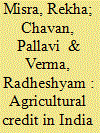

|
|
|
|
|
| Summary/Abstract |
The period of the 2000s witnessed a sharp revival in agricultural credit in India that was largely policy induced. There were emerging shifts in institutional, functional and regional distributions of agricultural credit during the decade. This study attempts to explore the relationship between agricultural credit and agricultural production/productivity. The state-level panel model attempted in this article suggests a positive impact of the intensity of agricultural credit on total factor productivity in agriculture. The impact was relatively stronger with respect to direct agricultural credit. A case study of the (combined) state of Andhra Pradesh also suggests a positive association between agricultural credit and agricultural production. The study lends credence to the policy approach of including agriculture, the largest employer in the Indian economy, as a sector for priority credit in India. It also highlights the point that the sector deserves continued policy support in order to move onto a sustainable and higher growth path.
|
|
|
|
|
|
|
|
|
|
|
|
|
|
|
|
| 2 |
ID:
188130


|
|
|
|
|
| Publication |
Gurugram, Penguin Random House India Pvt Ltd, 2022.
|
| Description |
viii, 651p.hbk
|
| Standard Number |
9780670093724
|
|
|
|
|
|
|
|
|
|
|
|
Copies: C:1/I:1,R:0,Q:0
Circulation
| Accession# | Call# | Current Location | Status | Policy | Location | IssuedTo | DueOn |
| 060248 | 338.0954/TEL 060248 | Main | Issued | General | | RA70 | 19-May-2024 |
|
|
|
|
| 3 |
ID:
129232
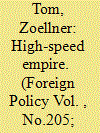

|
|
|
|
|
| Publication |
2014.
|
| Summary/Abstract |
Chinese rail is sprawling, modern, and elegant. It's also convoluted, corroding, and financially alarming. Wanna take a ride? THE BULLET TRAIN hurtles toward the industrial city of Taiyuan in northern China, and seemingly within seconds, the modern, smog-soaked Beijing skyline gives way to open fields. David Su is munching on pistachios in the bar car, careful that not a crumb hits his blue foulard scarf, as he heads some 320 miles to reach his early-morning appointment for a private equity firm. Over his shoulder, the Chinese countryside is a disembodied blur: farms and factories receding at the mind-aching speed of 186 miles per hour. Cars on a nearby highway seem to be creeping along by comparison. Su travels frequently for his job at Global Capital Investments Group, and he likes this new high-speed train, zipping along on one of several dozen lines built by the Chinese government in a decade-long blitzkrieg program that now has a price tag of $500 billion.
|
|
|
|
|
|
|
|
|
|
|
|
|
|
|
|
| 4 |
ID:
087789
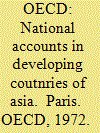

|
|
|
|
|
| Publication |
Paris, OECD, 1972.
|
| Description |
483p.
|
|
|
|
|
|
|
|
|
|
|
|
Copies: C:1/I:0,R:0,Q:0
Circulation
| Accession# | Call# | Current Location | Status | Policy | Location |
| 011262 | 339.3091724/OEC 011262 | Main | On Shelf | General | |
|
|
|
|
| 5 |
ID:
129095
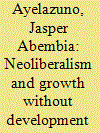

|
|
|
|
|
| Publication |
2014.
|
| Summary/Abstract |
Ghana witnessed decent economic growth in the last three decades of implementing neoliberal policy prescriptions. Indeed, this growth promoted it to a low middle income country in 2010. Paradoxically, the wellbeing of most Ghanaians in the subaltern classes has not improved significantly, and they still suffer grinding poverty. How to understand this paradox of growth without development? This paper argues that the failure of Ghana to diversify its economy into industrialization, particularly manufacturing, explains the paradox. With its relatively good politics and open economy, the Ghanaian state should spearhead industrialization, as South Korea and Malaysia did, by supporting selective manufacturing firms with capital, technology, and protective tariffs.
|
|
|
|
|
|
|
|
|
|
|
|
|
|
|
|
| 6 |
ID:
125284
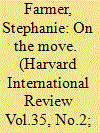

|
|
|
|
|
| Publication |
2013.
|
| Summary/Abstract |
The possibilities for constructing environmentally sustainable public transit infrastructure in the United States are strongly shaped by the logic and policies of neoliberalism. In brief, neoliberal ideology advocates for the extension of market-based principles in the arena of the state in order to "liberate" both public services from so-called state inefficiencies and capital "squandered" by taxation that could be more profitably deployed by private actors. Accordingly, neoliberal governance frameworks promote fiscal austerity and market discipline over the state.
Farmer, Stephanie
|
|
|
|
|
|
|
|
|
|
|
|
|
|
|
|
|
|
|
|
|